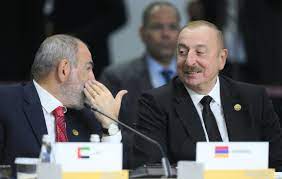Azerbaijan Warns of Growing Instability in Middle East Amid Expanding Regional Tensions

Azerbaijan Highlights Mounting Concerns in the Middle East
The Minister of Foreign Affairs of Azerbaijan has raised alarm over the widening scope of conflicts and instability in the Middle East. Speaking at a recent international conference, the Foreign Minister expressed deep concern over the “expanding geography of tensions” and its potential consequences for regional and global security.
According to the Minister, the increasing complexity of Middle Eastern conflicts threatens not only the countries directly involved but also neighboring regions, including the South Caucasus. Azerbaijan, located at the crossroads of Europe and Asia, has consistently advocated for peace, cooperation, and multilateral dialogue to manage regional crises.
Ripple Effects of Escalating Middle East Conflicts
The Azerbaijani FM emphasized that continued military clashes, rising sectarian divisions, and foreign interventions in the Middle East are rapidly spilling beyond traditional conflict zones. From Syria and Iraq to tensions involving Iran, Israel, Lebanon, and the Red Sea, the Minister warned that regional rivalries are becoming increasingly interconnected.
“The consequences of unchecked escalation could severely undermine international peace and regional economic development,” the Minister said, urging global powers to take a balanced approach to de-escalate conflicts.
Azerbaijan’s Stance on Regional Stability
Azerbaijan has long positioned itself as a responsible regional actor promoting diplomacy and non-interference. The FM reiterated that while Azerbaijan respects the sovereignty of all nations, it is vital for states to engage in inclusive dialogue, especially as the nature of regional conflict shifts from isolated hotspots to broader geopolitical fault lines.
“What happens in the Middle East does not stay in the Middle East,” the FM noted. “From energy corridors to security cooperation, the South Caucasus is not immune to the ripple effects of these tensions.”
Global Diplomacy Needed to Defuse Tensions
Echoing sentiments shared by other diplomats, the Azerbaijani Minister called for renewed multilateral diplomacy involving the United Nations, Organization of Islamic Cooperation (OIC), and other regional blocs. He emphasized the importance of upholding international law, respecting national sovereignty, and halting the spread of proxy conflicts.
“Only through constructive diplomacy and mutual respect can we restore stability in the Middle East,” the Minister asserted.
Implications for Energy and Security
Beyond the humanitarian toll, the expanding Middle East tensions also threaten global energy supply chains. Azerbaijan, as a major oil and gas exporter, is concerned about the security of international transit routes through the Persian Gulf and Red Sea, especially given recent attacks on shipping lanes and infrastructure.
The Minister noted that Azerbaijan remains committed to participating in international security frameworks to ensure energy infrastructure remains protected and accessible to global markets.
Conclusion: A Call for Caution and Cooperation
The warning from Azerbaijan’s top diplomat underscores growing international anxiety over the worsening situation in the Middle East. As regional rivalries widen and the theater of conflict expands, the need for preventive diplomacy and strategic restraint becomes more urgent than ever.
Azerbaijan’s position as a bridge between East and West offers a unique platform for dialogue — one that the FM hopes global leaders will utilize to de-escalate rising threats and return to peaceful negotiations.

